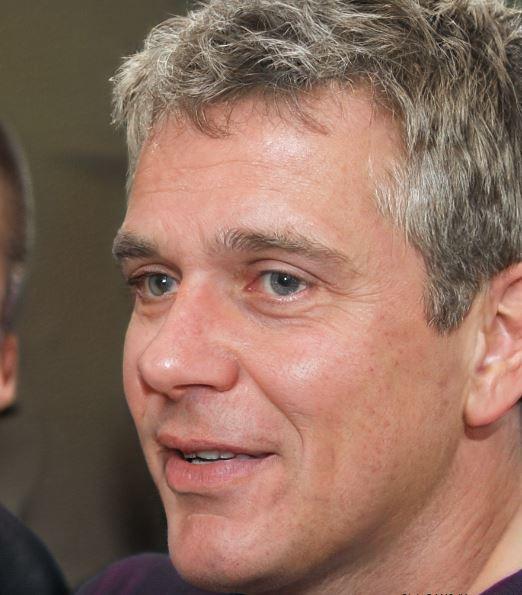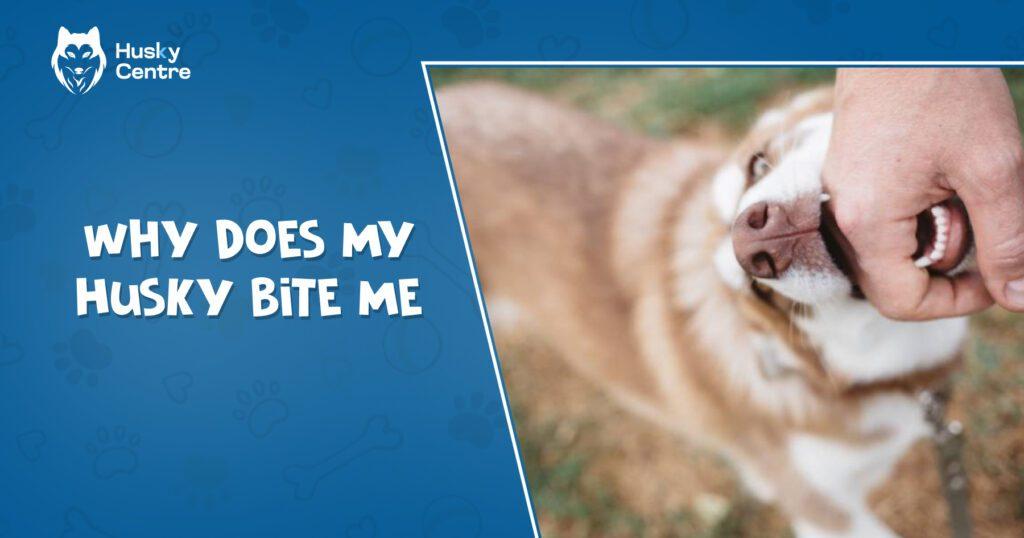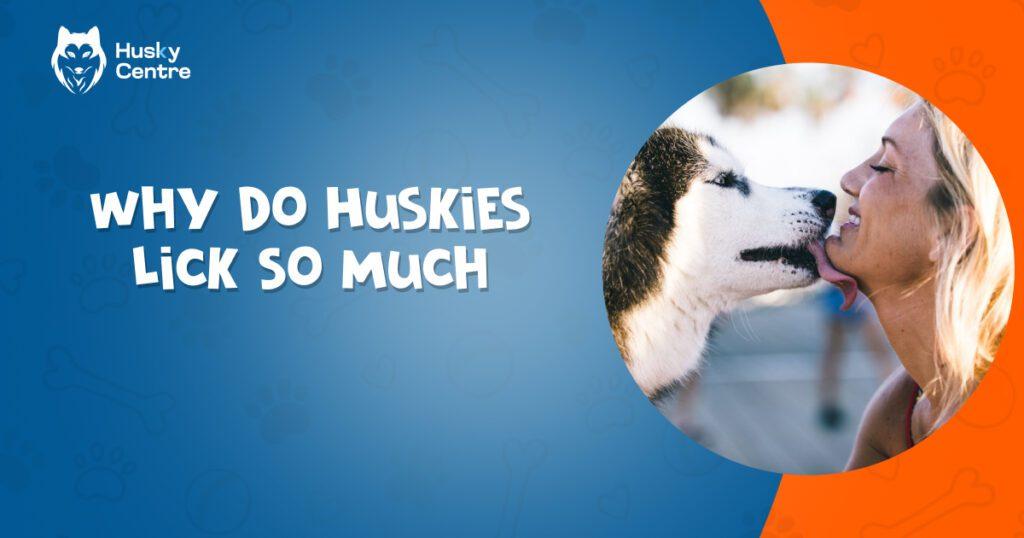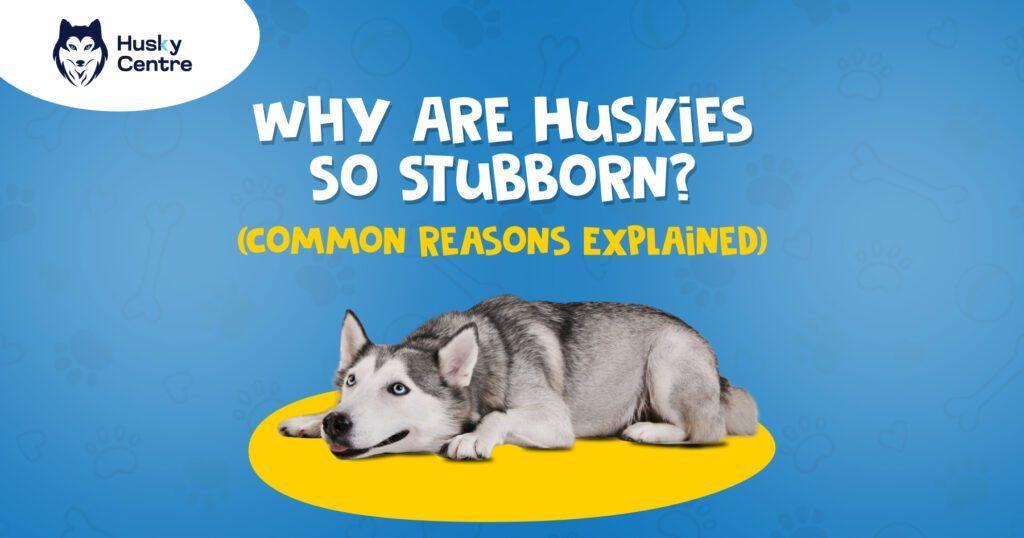Your Husky may bite due to teething, playfulness, or a need for attention. It can also stem from anxiety or fear.
Huskies are energetic and intelligent dogs that often exhibit playful behavior. Biting can be a common issue, especially in young Huskies. Understanding the reasons behind this behavior is crucial for effective training. Teething can cause discomfort, leading puppies to bite.
Playful nipping is another reason, as Huskies are naturally exuberant. Anxiety or fear can also trigger biting. Proper training, socialization, and providing adequate mental and physical stimulation can help curb this behavior. Consulting with a professional trainer or veterinarian can offer tailored solutions. Addressing this issue early ensures a well-behaved and happy Husky.
Understanding Husky Behavior
Many Husky owners often ask, “Why does my Husky bite me?” To find answers, it’s essential to understand the unique behavior of this breed. Huskies have specific characteristics and natural instincts that influence their actions. By understanding these traits, you can address the biting behavior more effectively.
Breed Characteristics
Huskies are known for their high energy levels and independent nature. These characteristics can sometimes lead to biting. Here are some key traits of Huskies that can explain their behavior:
- High Energy: Huskies are active dogs. They need a lot of physical exercise and mental stimulation. Without enough activity, they can become bored and may start biting as a way to release their energy.
- Social Animals: Huskies love being around people and other dogs. They might bite playfully to get attention or during interactions.
- Strong Prey Drive: Huskies have a strong instinct to chase and bite moving objects. This can sometimes include your hands or feet.
- Stubbornness: Huskies are known for their independent streak. They might bite if they feel frustrated or if they think it’s a way to get what they want.
To manage these traits, ensure your Husky gets plenty of exercise and social interaction. Proper training and consistent boundaries are also crucial.
Natural Instincts
Huskies have several natural instincts that contribute to their biting behavior. Understanding these can help you address the issue effectively:
- Playful Nature: Huskies use their mouths to explore the world. Biting can be a form of play for them, similar to how they would interact with their littermates.
- Teething: Young Huskies go through a teething phase. During this time, they might bite to soothe their gums. Providing appropriate chew toys can help.
- Protection: Huskies have a natural instinct to protect their territory and loved ones. They might bite if they feel threatened or if they sense danger.
- Communication: Biting can be a way for Huskies to communicate discomfort, fear, or anxiety. Pay attention to other signs like growling or showing teeth.
To address biting due to natural instincts, provide your Husky with safe outlets for their energy and instincts. Training and socialization from a young age can also help.
Common Reasons For Biting
Huskies are known for their playful and energetic nature, but sometimes this can lead to biting. Understanding the common reasons for biting helps address the issue effectively. Whether it’s teething, playful behavior, or seeking attention, each reason has specific triggers and solutions.
Teething In Puppies
Puppies go through a teething phase, just like human babies. During this period, their gums are sore, and they chew on things to relieve the discomfort. Teething usually starts around 3 weeks old and can last until they are about 6 months old.
Here are some signs your husky puppy is teething:
- Excessive chewing on objects
- Drooling more than usual
- Whining or showing discomfort
To help your puppy during this phase, provide appropriate chew toys. Avoid giving them household items, as this can confuse them about what is acceptable to chew on. Chew toys designed for teething puppies are softer and safer for their developing teeth.
Also, consider freezing a wet washcloth and allowing your puppy to chew on it. The cold can soothe their sore gums. Regularly check their teeth and gums for any signs of infection or abnormal growth.
Playful Behavior
Huskies are naturally playful dogs. Sometimes, their play can involve nipping or biting. This behavior is common in young dogs and is their way of interacting with their environment and companions.
Playful biting often happens during games like tug-of-war or chase. Huskies might also bite to get your attention or invite you to play. While this behavior is normal, it’s essential to teach them boundaries.
Here are some tips to manage playful biting:
- Redirect their energy to appropriate toys.
- Use commands like “no” or “stop” to signal that biting is not okay.
- Reward them with treats or praise when they play without biting.
Consistency is key. Ensure all family members follow the same rules to avoid confusing your husky.
Attention-seeking
Huskies are social animals and crave attention from their owners. If they feel ignored, they might resort to biting to get your attention. This behavior is their way of saying, “Look at me!”
To address attention-seeking biting, ensure you spend quality time with your husky. Engage in activities that stimulate them mentally and physically, such as:
- Daily walks
- Interactive toys
- Training sessions
When your husky bites for attention, don’t reward the behavior by giving them what they want. Instead, teach them that calm behavior gets your attention. Over time, they will learn that biting is not the way to get noticed.
Fear Or Anxiety
Fear or anxiety can cause a husky to bite. This type of biting is often defensive and can happen if they feel threatened or scared. Common triggers include loud noises, unfamiliar people, or other animals.
To help a fearful or anxious husky, identify and address the root cause of their fear. Gradual desensitization can be effective. For instance:
- Expose them to the trigger in a controlled environment.
- Reward calm behavior with treats and praise.
- Increase exposure gradually over time.
In severe cases, consult a professional dog trainer or behaviorist. They can provide tailored strategies to help your husky overcome their fears.
Territorial Behavior
Huskies can be territorial, especially in their home environment. They might bite to protect their territory from perceived threats. This behavior is often seen in adult dogs and can be directed towards strangers or other animals.
To manage territorial biting, establish clear boundaries and rules. Socialize your husky from a young age to reduce territorial instincts. Introduce them to new people and animals gradually and under controlled conditions.
Use positive reinforcement to reward non-aggressive behavior. If your husky shows signs of territorial aggression, such as growling or snapping, redirect their attention to a command or a toy. Consistency and patience are crucial in modifying this behavior.
Overstimulation
Overstimulation can cause a husky to bite. This happens when they become too excited or overwhelmed. It can occur during playtime, in crowded environments, or when they are exposed to too many stimuli at once.
To prevent overstimulation, monitor your husky’s behavior for signs of excitement or stress. These signs include:
- Panting
- Jumping
- Restlessness
When you notice these signs, give your husky a break. Provide a quiet space where they can relax and calm down. Gradually expose them to stimulating environments to build their tolerance.
Training commands like “sit” or “stay” can help manage their excitement. Reward calm behavior to reinforce the desired response. Ensuring your husky gets enough physical and mental exercise can also reduce the likelihood of overstimulation.
Addressing And Preventing Biting Behavior
Huskies are known for their energetic and playful nature, but sometimes this playfulness can turn into biting. Understanding why your Husky bites and how to address and prevent this behavior is crucial. Biting can stem from various reasons, such as teething, boredom, or even anxiety. Addressing and preventing biting behavior involves several key steps, including training, providing proper toys, setting boundaries, and recognizing triggers.
Training And Socialization
Training and socialization are essential for managing your Husky’s biting behavior. Basic Obedience Training helps your Husky understand commands and your expectations. Consistent training sessions teach them what is acceptable behavior. Here are some effective training tips:
- Use positive reinforcement techniques, such as treats and praise, to reward good behavior.
- Practice commands like “sit,” “stay,” and “leave it” regularly.
- Enroll your Husky in a puppy training class to improve their social skills.
Socialization Techniques also play a vital role. Expose your Husky to different environments, people, and other animals to reduce fear and aggression. Socialization helps them learn how to interact appropriately with others. Consider these steps:
- Take your Husky on daily walks in various settings.
- Arrange playdates with other well-behaved dogs.
- Visit dog parks to encourage interaction in a controlled environment.
Providing Proper Toys And Chew Items
Huskies often bite out of boredom or teething discomfort. Providing proper toys and chew items can help redirect this behavior. Here are some tips:
- Offer a variety of toys, such as rubber bones, squeaky toys, and puzzle feeders.
- Choose durable chew items that are safe and non-toxic.
- Rotate toys regularly to keep your Husky engaged and interested.
Here’s a table of recommended toys for Huskies:
| Type of Toy | Benefits |
| Kong Classic | Durable, can be filled with treats, helps with teething |
| Nylabone Dura Chew | Long-lasting, satisfies chewing urge, promotes dental health |
| Interactive Puzzle Toys | Mentally stimulating, reduces boredom |
Ensuring your Husky has the right toys keeps them occupied and reduces the likelihood of biting out of frustration or boredom.
Setting Boundaries And Consistency
Setting boundaries and maintaining consistency is crucial for preventing biting behavior. Your Husky needs to understand what is acceptable and what is not. Here are some strategies:
- Establish clear rules and stick to them. For example, no biting during playtime.
- Use a firm “no” or “ouch” when your Husky bites, then redirect their attention to a toy.
- Ensure all family members follow the same rules and techniques to avoid confusion.
Consistency is key. Regularly reinforce good behavior and correct unwanted actions immediately. This helps your Husky learn faster and understand boundaries better. Here is a simple plan to follow:
- Identify specific behaviors you want to discourage, like biting during play.
- Respond immediately with a consistent command or action.
- Reward your Husky when they follow the rules to reinforce positive behavior.
Recognizing And Responding To Triggers
Identifying and responding to triggers that cause biting is essential. Recognize what sets off this behavior and manage those triggers effectively. Common triggers include:
- Overstimulation during play
- Anxiety or fear
- Lack of physical or mental exercise
Identifying Triggers requires observation. Watch your Husky closely to see what prompts them to bite. Once identified, you can take steps to minimize these triggers. Here are some actions:
- Provide plenty of physical exercise to burn off excess energy.
- Engage in mental stimulation activities like training or puzzle toys.
- Create a calm environment to reduce anxiety and stress.
Managing Environmental Factors is also crucial. Ensure your Husky’s environment is safe and free from stressors. This includes providing a comfortable resting area, regular feeding schedules, and a predictable routine. By recognizing and responding to triggers, you can effectively reduce and prevent biting behavior in your Husky.
When To Seek Professional Help
Huskies are known for their playful and energetic nature, but sometimes, their biting can become a concern. Understanding why your Husky bites you is crucial, and knowing when to seek professional help can make a significant difference. This section will guide you on recognizing the signs that indicate it’s time to consult an expert.
When The Biting Becomes Aggressive
Aggressive biting is a serious issue that requires immediate attention. If your Husky’s bites are causing injury or drawing blood, it’s essential to seek professional help. Aggression can stem from fear, anxiety, or territorial behavior, and a professional can help address these underlying causes.
Consistent Biting Despite Training
If your Husky continues to bite despite your training efforts, it might be time to consult a professional. Inconsistent training results indicate that there could be deeper behavioral issues at play. A professional dog trainer or behaviorist can provide tailored strategies to curb this behavior.
Signs Of Anxiety Or Fear
Anxiety and fear can manifest through biting. If your Husky shows signs of stress, such as excessive panting, pacing, or hiding, alongside biting, it’s crucial to seek help. A professional can work on desensitization and counterconditioning techniques to alleviate your dog’s anxiety.
Unprovoked Biting
Unprovoked biting is a red flag. If your Husky bites without any apparent reason or warning, it could indicate a serious behavioral issue. Professionals can conduct a thorough assessment to determine the root cause and provide effective solutions.
Severe Changes In Behavior
Noticeable changes in your Husky’s behavior, such as increased aggression or sudden biting, warrant professional intervention. Drastic behavior changes can be linked to health issues, trauma, or environmental factors. A veterinarian or a behaviorist can help diagnose and treat these problems.
Injuries From Biting
| Type of Injury | Action Required |
| Minor Scratches | Monitor and apply basic first aid |
| Puncture Wounds | Seek immediate veterinary care |
| Severe Bleeding | Emergency veterinary attention |
Injuries from biting should never be taken lightly. If your Husky’s biting results in any of the above injuries, professional help is necessary to prevent further harm and address the behavior.
Frequently Asked Questions
How Do I Get My Husky To Stop Biting Me?
Train your husky with consistent commands. Use positive reinforcement like treats. Redirect biting to toys. Socialize your husky often. Consult a professional trainer if needed.
Why Does My Husky Randomly Bite Me?
Your husky may bite due to teething, playfulness, or seeking attention. Training and socialization can help reduce biting.
Why Is My Husky Attacking Me?
Your husky may attack due to fear, pain, lack of training, or dominance issues. Consult a vet or trainer.
At What Age Do Huskies Stop Biting?
Huskies usually stop biting by 6-12 months. Consistent training and socialization help curb this behavior.
Conclusion
Understanding why your Husky bites is crucial for a harmonious relationship. Identifying triggers and providing proper training can help. Consistent efforts to address biting behavior will foster trust. Remember, patience and positive reinforcement are key. By addressing these issues, you can ensure a happier, bite-free bond with your Husky.


Meet Jarred, the heart and soul behind HukyCentre. With a deep affection for furry friends, he pours his passion into every word he writes. His genuine love for dogs shines through in his engaging and informative content. As a dedicated dog enthusiast, Jarred’s goal is to share valuable insights and tips that resonate with fellow dog lovers. Join Jarred on the journey as he celebrates the joy and companionship that dogs bring into our lives.



